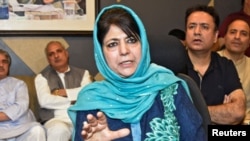A former chief minister in Indian Kashmir, Mehbooba Mufti, vowed to continue a struggle for restoration of the region's autonomy on her release from detention by Indian authorities after 14 months.
Mufti was placed under house arrest last August after India's Hindu nationalist government scrapped Kashmir's decades-long partial autonomy – a move that triggered widespread anger in its only Muslim-majority region.
Mufti was among several top Kashmiri leaders held under a tough law that allows for detention without trial for up to two years – she is the last mainstream political leader to be freed.
The government has said that politicians and activists were detained to contain unrest and maintain law and order in the restive region where India has struggled to control a violent Islamic separatist insurgency for over three decades.
Prime Minister Narendra Modi had said scrapping Kashmir's special status would help integrate it more closely with the rest of India and spur its development.
After being freed late Tuesday, Mufti called it a "black decision."
"None of us can forget the insult and humiliation we faced on that day. And we all have to pledge that we will take back what was snatched illegally, undemocratically and unconstitutionally on 5 August last year," she tweeted in an audio message. "We will also have to work for the resolution of Kashmir issue for which thousands of people have laid down their lives."
She called for the release of those still in detention – hundreds of activists, local businessmen and local party workers are believed to still be in custody.
Mufti's release came two days before the Supreme Court was due to hear a habeas corpus petition filed by her daughter challenging her mother's detention. The top court had questioned the government over how long a person could be kept in custody under a stringent preventive detention law.
"The protracted detention of the mainstream Kashmiri political leadership has exacerbated bitterness against the ruling party, it has created massive resentment," according to Wajahat Habibullah, a former top bureaucrat who has worked in Kashmir.
Bringing Kashmir under direct federal control was widely seen as a move to tighten the government's grip on the restive region.
Human rights groups and critics slammed the tough measures to contain protests in the region since the dramatic move.
In a report issued in August marking a year since the revocation of Kashmir's special status, human rights watchdog Amnesty International called on the government to release all detainees and restore high speed internet.
Observers describe the situation in the region, where thousands of security forces continue to be deployed to keep a lid on protests, as grim and they say support for the Indian government has dropped.
"It is very grave," according to Habibullah. "India did have a large support base in Kashmir, but that support base fell off after it was brought under federal control."





